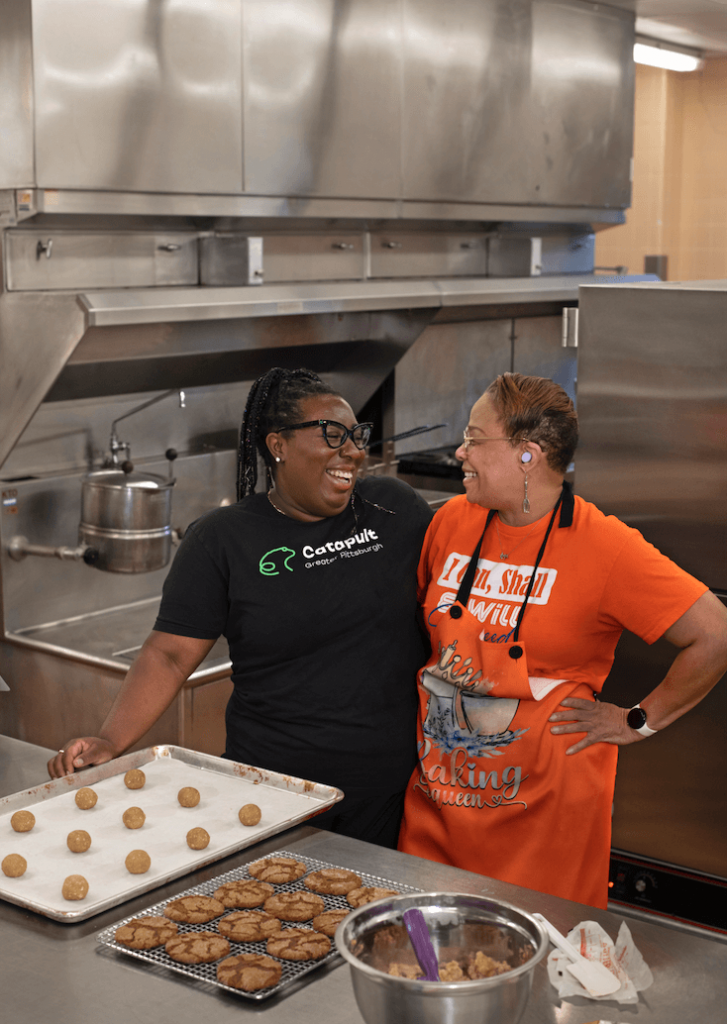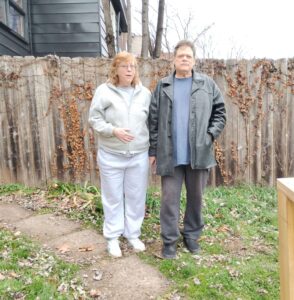When Catapult’s Executive Director Tammy Thompson was fired from her job without warning more than a decade ago, she started cooking and selling meals out of her home to get by.
It’s a reality that many in the Catapult Culinary program are familiar with: entrepreneurship born out of a need, with that need first being met in their home kitchens.
“At Catapult, we recognize the untold potential of this underground food economy, and we want to help legitimize it,” said Thompson.
Confronting Barriers to Entry
Whether Catapult Culinary participants are starting as home chefs or have worked in the food industry for years, the six-month program helps them professionalize their businesses and take them to the next level. One key way we do that is by offering ServSafe training and certification.
ServSafe is a food safety qualification for food service professionals, ensuring they follow safe food handling and preparation practices. It is a requirement, and often a barrier to entry, for food-based businesses in Pittsburgh.
“Throughout the Catapult Culinary program, entrepreneurs learn how to get their business license, launch their website, different things like that, but in order to even be in the kitchen or handle food, they have to have their ServSafe Food Handler Certification,” said Nissa’a Stallworth-Hewitt, the manager of Catapult’s commercial kitchen in Bellevue, which cohort members can use for free for a year after graduation.
All Catapult Culinary cohort members leave the program with their ServSafe Manager Certification, an essential requirement to manage a food-based business as an owner and operator. Participants just need to pay for the ServSafe Manager Book; Catapult covers the cost of the exam which can be up to $200.
Offering Flexibility as a Source of Support
As part of her role as commercial kitchen manager, Catapult paid for Hewitt to become a certified ServSafe Proctor and Instructor. The certification builds on Hewitt’s over 15 years of experience in the food industry and enables her to host Catapult study groups, teach participants the ServSafe content, and administer the exams. In the study groups, Catapult participants learn everything from how high off the ground food equipment should be to how to rotate their food and safely handle allergens. Unlike many organizations that offer certification, Catapult works around the schedule of program participants.
“We know you have other jobs, we know you have kids, so we offer it in the afternoon or on a Saturday,” said Stallworth. “You come in, we’ll cater it, we’ll study a little, and then we take the test. We offer two exam sessions, so if you fail session A, you can come to session B, and hopefully, that’ll be more successful for you.”
For Catapult Culinary members—90% of whom are Black single mothers, according to February 2024 data—this flexibility is an essential source of support.
Allowing Entrepreneurs to Bloom
For chefs who are used to cooking at home or working in a non-managerial role, the ServSafe training process exposes them to the nitty gritty details of running a successful food business.
“Many of our chefs are just doing their thing and being creatives so they don’t know all those particular things you have to learn in order to be safe,” shared Stallworth.
While taking a test can seem daunting at first, Stallworth finds that many participants want to learn more once they get into the content, whether that’s diving deeper into the ideal cooking equipment or learning more about food allergens.

“It’s been great to see everyone bloom when they have the opportunity. Many are relieved when they realize that these are things that they’ve either been practicing already or that can help them better run their business. I’m just very lucky to help them on their journey.”
Nissa'a Stallworth-Hewitt





